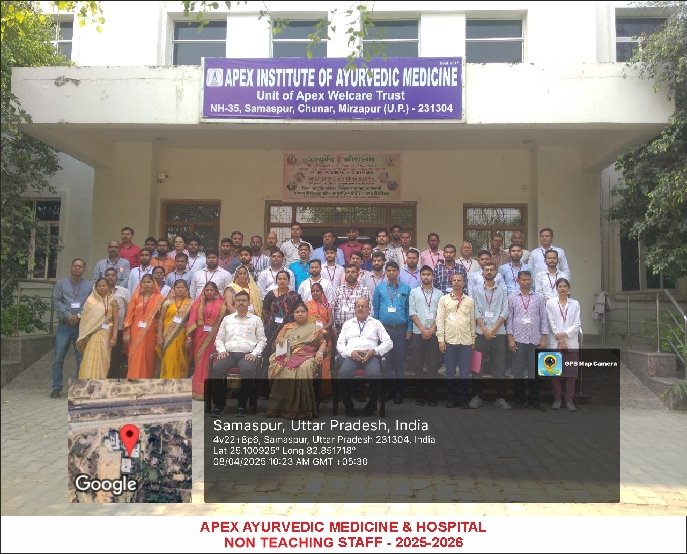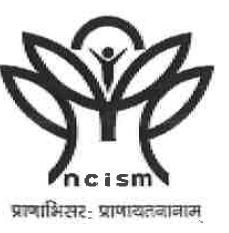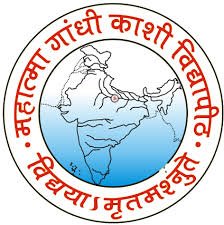Important Information for CCIM / Min. of AYUSH
1 |
Details of Principal & Medical Superintendent |
Prof. Dr. Prabhat Kumar Singh
Age – 60 years
BAMS, MS, (Shalakya Tantra)
Registration Number: 39656
Date of Joining – 01/06/2022
Address : B-31/35 KA-5,
Lanka, Varanasi
Mob: 9415204632
E-mail: pks6462@gmail.com |
2 |
Details of teaching staff (along with their photograph, registration number, date of birth, qualification, experience, Department) |
Teaching Staff details
|
3 |
Details of non-teaching staff of college and hospital staff |
Non-Teaching Staff Details
Hospital Staff Details |
4 |
Details of the sanctioned intake capacity of various courses under graduate as well as post graduates |
|
5 |
Committees |
1. Academic Council Academic Committee
2. Anti-Ragging Cell Constitution Order
3. Co-Curicular and Extra Curricular Activity Cell Constitution Order
4. College Council Committee Constitute.html
5. Committee Against Sexual Harassment Cell Constitution Order
6. Grievance Redressal Cell Committee Order
7. Human Resources Cell Constitution Order
8. Internal Quality Assurance Cell Constitution Order
9. Research Cell Constitution Order
10. Student Council Constitution Order
11. Student Support and Career Guidance Placement Cell Constitution Order
|
6 |
List of students admitted, merit-wise, category-wise for the current and previous year |
List of Students Batch 2017-18
List of Students Batch 2018-19
List of Students Batch 2020-21
List of Students Batch 2021-22
List of Students Batch 2022-23
List of Students Batch 2023-24
List of Students Batch 2024-25
|
7 |
Any research publications during the last one year |
IMPORTANCE OF DIET AND HEALTHY LIFESTYLE IMPLEMENTATION IN PREVENTION OF ARDHAVABHEDAKA (MIGRAINE) by
1. Dr. Abha Singh(Assistant Professor, Dept. of Kriya Sharir)
2. Dr. Vineeta Singh (Assistant Professor, Dept. of Swasthavritta & Yoga)
Certifications:
1. Dr. Abha Singh
(Assistant Professor, Dept. of Kriya Sharir)
2. Dr. Abha Singh
(Assistant Professor, Dept. of Kriya Sharir)
3. Dr. Vineeta Singh
(Assistant Professor, Dept. of Swasthavritta & Yoga)

Details of Research publication by
Dr. Rajneesh Pathak
(Assistant Professor, Dept. of Kayachikitsa)
ROLE OF SOME AYURVEDIC DRUGS IN MANAGEMENT OF KAPHAJAGRAHANI DOSHA: A
SINGLE CASE STUDY
EPILEPSY (APASMAR) & ROLE OF AYURVEDA IN ITS MANAGEMENT
ROLE OF AYURVEDIC FORMULATIONS IN HRIDAY ROGA: A CASE STUDY
EFFECT OF VAMANA KARMA ALONG WITH SHAMAN TREATMENT IN PSORIASIS ERYTHRODERMA - A SINGLE CASE STUDY
Details of research publication by Dr. Anil Kumar-
CASE REPORT OF PILONIDAL SINUS
(NADI VRANA)
COMPREHENSIVE REVIEW OF GUDA PARIKARTIKA ( FISSURE IN ANO) IN AYURVEDA
Shatkriyakala in Vranashopha
Details of research publication by Dr. Anil Kumar
-CASE REPORT OF PILONIDAL SINUS
(NADI VRANA)
COMPREHENSIVE REVIEW OF GUDA PARIKARTIKA ( FISSURE IN ANO) IN AYURVEDA
Shatkriyakala in Vranashopha

Details of research publication by Dr. Dilip Kr Upadhyay
1. Scope and possible magnitude of panchakarma in sports medicines - A review
2. Definition, types and advantages of vasti chikitsa (therapeutic enema) according to various ayurvedic texts: A review
3.Effect of ayurvedic treatment on physical and radiological parameters in knee osteoarthritis: A case report
4.Rapid improvement in lipid profile parameters during & after vamana karma : a case report
|
8 |
Details of any Continuous Medical Education (CME) programmes, conferences and/or any academic
activities conducted by the institution |
Ayurved Kaushalam 02/03/2025
CME on Gastroenterology on 29/12/2020
Ayurveda Day & Dhanwantari Poojan

Sports Injuries & Arthroscopic Management CME

Seminar on Ritu Sandhi

CME cum Academic Session on Neurology

Academic Session on Gynaecology by Dr. Sulekha Pandey

National Seminar organized by Apex on Role of Ayurveda in Geriatric Care
|
9 |
Result of all the examinations of last one year |
Result
BAMS 2021 Batch 1st Professional Re-Supply - MGGAU
BAMS 2022 Batch 1st Professional - MGGAU
B.A.M.S. First Professional Regular Exam 2018
B.A.M.S. First Professional Supplementary Exam 2018
B.A.M.S. Second Professional Regular Exam 2019
B.A.M.S. Third Professional Regular Exam 2022
|
10 |
Details of clinical material in the hospital |
|
11 |
The College website shall be linked with the Central Council website, which shall be linked to the Ministry’s
website as well; |
Website is available, Neccessary action has to be taken by CCIM/ Ministry for linking. |
12 |
The Month-wise analysis of attendance of teaching, non-teaching college staff, hospital staff, students and Patients in Out-Patient Department and In-Patient Department |
Attendance Details of students
1st Year Student attendance (Junior Batch)
1st Year Student attendance (Senior Batch)
2nd Year Student attendance (Junior Batch)
2nd Year Student attendance (Senior Batch)
3rd Year Student attendance
|
|
The Apex Institute of Ayurvedic Medicine & Hospital, situated in Samaspur, Chunar, Mirzapur, just 30 Km. from Varanasi Cantt. Station & Deen Dayal Upadhyay Station, 25 Km. from B.H.U. & 1 Km. from Chunar Railway Station. The campus is situated in lap of most natural place, having hills on one side & River Ganges on another.
Click here for Google Map of the college
Click here for Geo tagged image gallery of the college & hospital
The college was established in 2015-16, governed by
“Apex Welcare Trust, Varanasi”
::APPROVALS::



|
|
 |
The National Commission for Indian System of Medicine (NCISM) act 2020.
The National Commission for Indian System of Medicine Bill, 2019 was introduced in Rajya Sabha by the Minister of State for AYUSH, Mr. Shripad Yesso Naik, on January 7, 2019. The Bill seeks to repeal the Indian Medicine Central Council Act, 1970 and provide for a medical education system which ensures: (i) availability of adequate and high quality medical professionals of Indian System of Medicine, (ii) adoption of the latest medical research by medical professionals of Indian System of Medicine, (iii) periodic assessment of medical institutions, and (iv) an effective grievance redressal mechanism.
Dr. Deopujari Jayant Yeshwant
Chairperson
Dr. Raghurama Bhatt U.
Secretary I/C
Click here (www.ccimindia.org) |
| |
 |
The Ministry of AYUSH was formed on 9th November 2014 to ensure the optimal development and propagation of AYUSH systems of health care. Earlier it was known as the Department of Indian System of Medicine and Homeopathy (ISM&H) which was created in March 1995 and renamed as Department of Ayurveda, Yoga and Naturopathy, Unani, Siddha and Homoeopathy (AYUSH) in November 2003, with focused attention for development of Education and Research in Ayurveda, Yoga and Naturopathy, Unani, Siddha and Homoeopathy.
Click here (www.http://ayush.gov.in/) |
| |
 |
KashiVidyapith having present nomenclature since 1995 as Mahatma Gandhi KashiVidyapith has, in fact been the action field of Indian National Movement as also a place of pilgrimage of Indian Socialist Movement. Founding resolution of “RASHTRA RATNA” Babu Shiva Prasad Gupt, inspiration of the “FATHER OF THE NATION” Mahatma Gandhi and brilliance of “BHARAT RATNA” Dr. Bhagwan Das were jointly responsible for the birth of this national educational institution.
http://www.mgkvp.ac.in/ |
| |
Covid-19 Protocol
What to do to keep yourself and others safe from COVID-19
-
- Maintain at least a 1-metre distance between yourself and others to reduce your risk of infection when they cough, sneeze or speak. Maintain an even greater distance between yourself and others when indoors. The further away, the better.
- Make wearing a mask a normal part of being around other people.
- Clean your hands before you put your mask on, as well as before and after you take it off.
- Make sure it covers both your nose, mouth, and chin.
Here are some specifics on what type of mask to wear and when, depending on how much virus is circulating where you live, where you go, and who you are.
-
-
- Wear a fabric mask unless you’re in a particular risk group. This is especially important when you can’t stay physically distanced, particularly in crowded and poorly ventilated indoor settings.
- Wear a medical/surgical mask if you:
- Are over 60,
- Have underlying medical conditions,
- Are feeling unwell, and/or
- Are looking after an ill family member.
Don’t forget the basics of good hygiene
-
-
- Regularly and thoroughly clean your hands with an alcohol-based hand rub or wash them with soap and water. This eliminates germs including viruses that may be on your hands.
- Avoid touching your eyes, nose, and mouth. Hands touch many surfaces and can pick up viruses. Once contaminated, hands can transfer the virus to your eyes, nose, or mouth. From there, the virus can enter your body and infect you.
- Cover your mouth and nose with your bent elbow or tissue when you cough or sneeze. Then dispose of the used tissue immediately into a closed bin and wash your hands. By following good ‘respiratory hygiene’, you protect the people around you from viruses, which cause colds, flu, and COVID-19.
- Clean and disinfect surfaces frequently especially those which are regularly touched, such as door handles, faucets, and phone screens.
What to do if you feel unwell
-
-
- Know the full range of symptoms of COVID-19. The most common symptoms of COVID-19 are fever, dry cough, and tiredness. Other symptoms that are less common and may affect some patients include loss of taste or smell, aches, and pains, headache, sore throat, nasal congestion, red eyes, diarrhea, or a skin rash.
- Stay home and self-isolate even if you have minor symptoms such as cough, headache, mild fever until you recover. Call your health care provider or hotline for advice. Have someone bring you supplies. If you need to leave your house or have someone near you, wear a medical mask to avoid infecting others.
- If you have a fever, cough, and difficulty breathing, seek medical attention immediately. Call by telephone first, if you can, and follow the directions of your local health authority.
- Keep up to date on the latest information from trusted sources, such as WHO or your local and national health authorities. Local and national authorities and public health units are best placed to advise on what people in your area should be doing to protect themselves.
|
|
|



